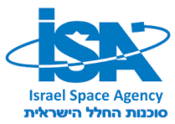Israel Space Agency facts for kids
| סוכנות החלל הישראלית | |
 |
|
| Agency overview | |
|---|---|
| Abbreviation | ISA |
| Formed | 1983 (Successor agency to National Committee for Space Research 1960-1983) |
| Type | Space agency |
| Headquarters | Tel Aviv, Israel |
| Administrator | Professor Yitzhak Ben Yisrael (Chairman), Avi Blasberger (Director General) |
| Primary spaceport | Palmachim Airbase |
| Owner | |
| Annual budget | ₪ 180 million / US$48 million |
| Website | space.gov.il |
The Israel Space Agency (ISA) is a special part of Israel's government. It works with the Ministry of Science and Technology. The ISA helps manage all of Israel's space projects. These projects are for science and for business.
A smart scientist named Professor Yuval Ne'eman started the ISA in 1983. It took over from an older group, the National Committee for Space Research, which began in 1960. That group helped build what was needed for space missions. Today, Professor Isaac Ben Israel is the Chairman, and Avi Blasberger is the Director General.
The ISA gives money to universities and government groups for space research. Their main goal is to help Israel's scientists learn more about space. They want to make Israel a leader in space technology. Israel is the smallest country that can launch its own satellites.
Contents
History of Israel's Space Efforts
The story of the Israel Space Agency began in the late 1950s. It started as a research project at Tel Aviv University. In 1960, the National Committee for Space Research (NCSR) was formed. This committee was created to help more scientists in Israel do research.
At first, building a space program wasn't their main goal. But from the 1960s to the late 1970s, the committee built the tools and knowledge needed for space exploration. One of their first big steps was in 1961. They successfully launched their first two-stage rocket.
What the Israel Space Agency Aims For
The Israel Space Agency has a clear vision for the future. This vision was set on July 27, 2005.
They believe that exploring space is very important for life on Earth. It helps technology grow and is key to living in a modern world. Space research also helps the economy and attracts smart people to science.
The ISA wants to keep Israel strong in space research. They aim to make Israel one of the top countries in space exploration.
Main Goals of the ISA
To achieve its vision, the ISA has several important goals:
- To build and support satellite systems for studying space and Earth.
- To create new technologies and scientific tools. This includes labs and training smart people.
- To work with other countries on space research and exploration. This helps Israel's national interests.
- To connect Israeli society with space research and exploration.
Israel's Satellite Programs
The Israel Space Agency has a long history of launching satellites. These satellites are used for looking at things from space and for communication.
Israel launched its first satellite, the Ofeq-1, on September 19, 1988. It was launched from the Palmachim Airbase in Israel. Since then, Israel has become an important player in the world of commercial space.
Today, the ISA launches different types of satellites, including:
- Ofeq – A series of reconnaissance satellites. These satellites are used for looking at things on Earth.
- Amos – A series of communication satellites. These help with TV, radio, and internet signals.
- Eros – A series of observation satellites. These take pictures of Earth.
- Techsat – A research satellite launched by the Technion university.
- TechSAR – An observation satellite that uses SAR technology. This helps it see through clouds.
The Israel Space Agency is also working on many other space projects. These include new satellites, space telescopes, and very small microsatellites.
Images for kids
-
The smaller 46cm Telescope in the Wise Observatory dome.
-
Ilan Ramon - the first Israeli astronaut
See also
 In Spanish: Agencia Espacial de Israel para niños
In Spanish: Agencia Espacial de Israel para niños
 | George Robert Carruthers |
 | Patricia Bath |
 | Jan Ernst Matzeliger |
 | Alexander Miles |








